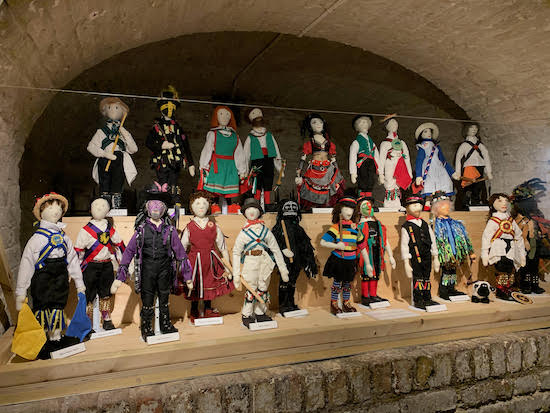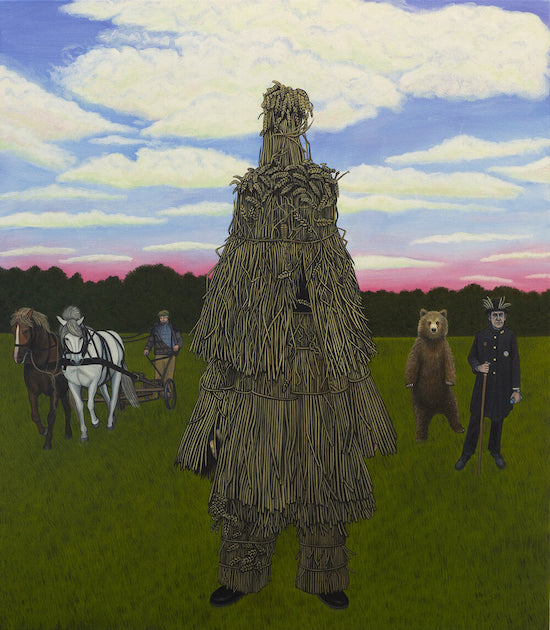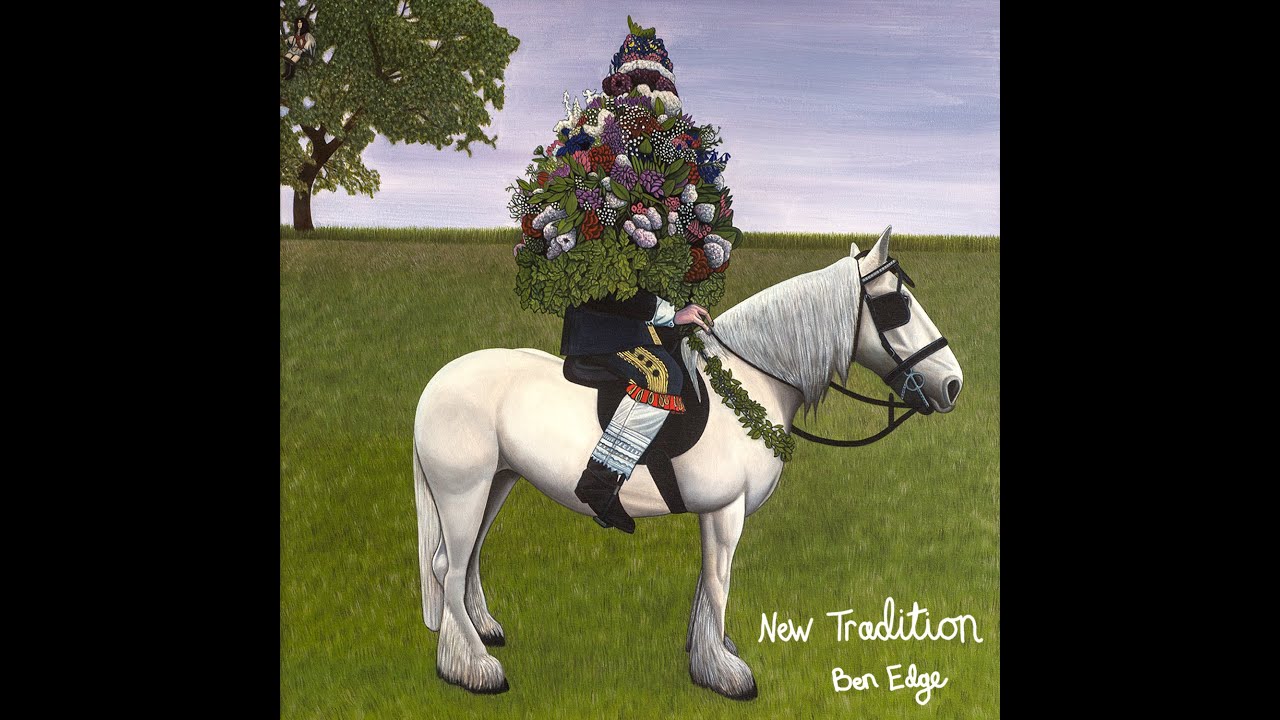Whittlesea Straw Bear, Ben Edge, 2020 © Ben Edge
“The present generation has witnessed the extinction of many observances which our fathers practiced and revered, and doubtless the progress of decay will continue. We have entered upon a diminished inheritance”
So wrote the Berkshire Reverend, historian and freemason PH Ditchfield, in 1896’s Old English Customs. And it is undoubtedly true that Britain’s folklore, vernacular arts, and calendar customs have weathered at least two centuries of colossal pressure from continuous social change. In British Folk Customs (1976), the folklorist Christina Hole cites “shifting populations, new building spreading over lands long dedicated to festival games, or dances, or the holding of unofficial fairs … new methods of the farm that have done away with ancient harvest or sheep-shearing ceremonies” plus “the two great wars” as having “contributed to the steady decline of old ways.” Fifty years on, such shifts have, if anything, intensified further, including through the digitisation of our work and social lives, and the contemporary echo of the industrial revolution’s mass migration from countryside to town that we see in the drift (of younger people especially) from towns to cities in pursuit of opportunity.
And yet despite these perils, many ancient customs remain in rambunctious health. The famous Horn Dance of Abbotts Bromley, Staffordshire, is believed to have emerged some time between the eleventh and sixteenth centuries, whilst champions of Lincolnshire’s Haxey Hood claim fourteenth-century origins. Both remain as vibrant (and as errant) as ever, alongside an immense, kaleidoscopic panoply of other traditions that run the full length of these isles – from midwinter fire rites like the Burning of the Clavie in the Scottish Highland town of Burghead, to the May Day ’Obby ’Oss in Padstow, Cornwall.
Although some such community practices do sadly continue to fade and fragment, numerous others have been inaugurated or re-initiated, such as the Cotswold Olympicks of Chipping Camden, Gloucestershire, dormant for a century until the 1951 Festival of Britain. Between the late 70s and the early 90s, Jack in the Green festivities have been restored in Rochester, Hastings, Deptford, and elsewhere. Whilst many customs have endured enforced pauses due to the pandemic, some have persisted in amended, socially-distanced format, or else gone online – sometimes to larger audiences than ever.
This week Ritual Britain, a new exhibition exploring these traditions and reflecting on their potential role at this tumultuous point in our Island story, opens in London. Probably the most complete gallery-based survey of British Calendar customs in over a decade, the exhibition brings together a wide selection of objects and images from the collection of the peripatetic Museum of British Folklore (MOBF), and twenty original paintings plus film, photography, and music by the artist Ben Edge.

Morris side dolls from the MOBF collection, Ritual Britain, 2021 ©MOBF
With this show, Edge and MOBF’s Founder Simon Costin have grasped a baton already held by a broad and curious array of predecessors. Throughout most of the twentieth century, the principle chroniclers of such festivities were folklorists like Hole, Bob Pegg (of 1970s folk rock trio Mr Fox), and even political historians like EP Thompson; as well as photographers and film-makers like Doc Rowe, Brian and Sally Shuel, and Homer Sykes.
Edge namechecks Rowe in particular, not only as a key influence, but as a mentor: “Doc Rowe has been amazing; I first met him in Abingdon whilst witnessing the Horns of Ock Street ceremony, and we instantly got on. Then after that, even before I arrived at places, Doc had already told the people involved I was coming and I’m an artist from London etc; and that was a really great thing, as it made me feel welcome wherever I went. Doc’s backing certainly opened doors for me in the world of folk customs.”
Ritual Britain can also be seen as a furtherance of a strong resurgence in interest from contemporary artists and art institutions witnessed since the turn of the millennium. Jeremy Deller and Alan Kane worked with Rowe and others to foreground these traditions in their contribution to the New British Art 2000 showcase at Tate Britain, and would further cultivate this fertile soil for 2005’s Folk Archive show at the Barbican (later acquired by the British Council, and still touring to this day).
Costin launched The Museum of British Folklore in 2009, initially ‘located’ in a touring caravan. The museum remains a nomadic venture that aims to promote historic understanding of – and creative engagement with – British vernacular culture. MOBF has tirelessly generated further, crucial sustained momentum in this field, producing acclaimed partnership exhibitions with settings including University of the Arts London, Compton Verney (Warwickshire), the Museum of East Anglian Life (Suffolk), and the Weald and Downland Living Museum (West Sussex). MOBF has also stimulated the engagement of major international institutions with these themes, collaborating with Christie’s for 2016’s The Ballad of British Folklore, and feeding into the 2014 British Folk Art show at Tate Britain.

Museum of British Folklore, Rye, 2009 ©MOBF
The course set by Deller and Kane in the visual arts, and further spurred by MOBF, converged with a wider resurgence of interest in folk song and dance driven by the trans-Atlantic ‘third great folk music revival’ of the mid-00s. A promising cluster of younger British artists have since emerged at this meeting point, including the likes of Anna FC Smith, Matt Rowe, Lucy Wright, Cleo Mussi, Julia Hayes, Lally MacBeth, and now Edge himself. Edge also attributes this flourishing shared creative interest to a yearning for ecological and community re-connection: “I think it’s to do with the issues we face politically – we have the climate crisis, so we need to urgently reconnect with nature. And whilst that sounds straightforward, for those of us living in an urbanised environment it’s easier said than done. So it’s a kind of activism to get out and reconnect with the seasons, and to reconnect yourself with the age-old practices that are a celebration of our collective human experience.”
Expanding upon this motif, Edge also reflects upon calendar customs as a vantage point from which to interrogate contested questions of identity and belonging – and even, perhaps, as a foundation for new, progressive and inclusive forms of Britishness: “It’s also to do with the identity crisis we have in this country. The whole concept of being British has kind of been consumed by a sense of the horrors of our colonial past, and people are struggling to take any sense of pride in being British, but with our folk culture we look at the inventive ways that oppressed peasants took control of their lives, by performing rituals to take back power and to perform a kind of magic to ensure all their basic survival needs could be met. This for me is definitely a healing thing, to celebrate and reconnect with, and could be the answer as we grapple with a new kind of identity that we can be proud of as we move forward as a multicultural nation.
“Rituals are a way for people to get to know each other, bask in their shared humanity, and a way of overcoming any misconceptions and preconditioned ideas that they may have for one another relating to ethnicity, class, and creed. I would also like to see people start their own rituals as a form of activism, in overcoming social boundaries and reconnecting with nature in an urgent time of climate crisis.”
His own ritual journey began entirely unexpectedly, in 2016. “I had a chance encounter with a group of druids performing a spring equinox ceremony on Tower Hill. Prior to that I’ve been interested in folklore for as long as I can remember. In childhood, my grandad used to take me and my siblings into the woods to look for the green man. The serendipitous experience of stumbling on the druids happened as a result of my interest in the Tower of London where I was on my way to paint the Ravenmaster on that particular day, where this whole project began.”
Edge’s artistic practice moves freely from canvass to camera to recording studio. His vivid, arresting paintings of key ritual events like the Burryman of South Queensferry, the Whittlesea Straw Bear, and Castleton’s Garland King anchor the exhibition. But the opening also coincides with the premiere of Frontline Folklore, a filmic gazetteer of twenty British customs, shot across the 2019 ritual year, plus Glass Modern’s release of Edge’s debut LP New Tradition, inspired by these practices, and produced by electronic composer (and Shirley Collins collaborator) Matthew Shaw.
Edge considers Ritual Britain, Frontline Folklore, and New Tradition as the convergent culmination of his five-year immersion in UK calendar customs, but also views this as a staging post to go further still. “To date I’ve explored what’s ‘in my own back garden’, but what interests me is the universality of rituals and the endless infinity of creativity, uniqueness and genius that can be found in each of these. So I look forward to carrying on to other parts of the world in my quest when the time is right.”
For Costin, the show is also part of a long-term ambition to create a permanent home for the Museum of British Folklore. The title track of Edge’s album, meanwhile, hints at an even longer-term goal:
Oh, I’m going to start a new tradition
A new kind of peasant superstition
And in a thousand years, the origins will disappear
Oh, I’m going to start a new tradition…
Ritual Britain is at the Crypt Gallery, London, until 4 July. A series of events also accompany the exhibition, including the premier of Edge’s film Frontline Folklore on 12 June



